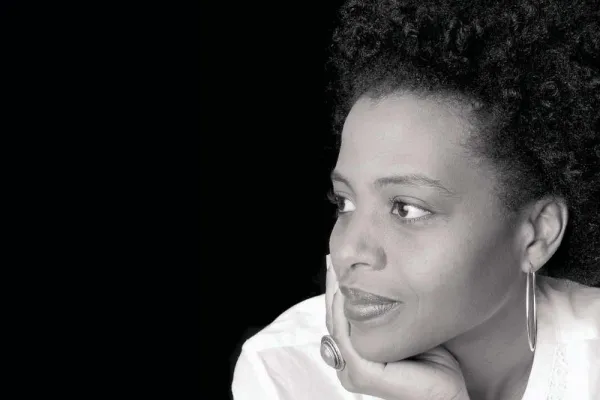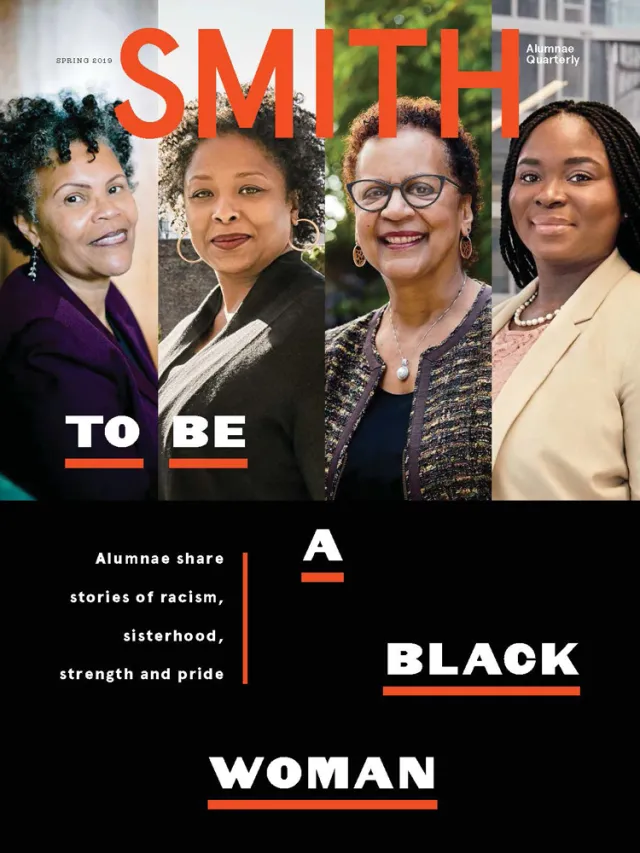‘I Yearned for a Comfort and Confidence in My Blackness’
Alum News

Published March 12, 2019
When I entered Smith College in 1990, I made a secret promise to myself: I wasn’t going to befriend any white people. You see, I had spent the first 18 years of my life living in all-white neighborhoods, socializing in all-white friend groups and graduating from a high school where I was the only black female in my senior class. Not only had I been surrounded by white people, I had been surrounded by white culture and knew very little about my own African American heritage.
College, I decided, was going to be a time to immerse myself in Blackness. But Smith didn’t exactly offer a lot of opportunities for an authentic Black experience. First of all, my roommate was white. And she was lovely. I couldn’t help myself. Jenny and I became fast friends.
Also, while I had assumed that I would naturally become friends with all of the other black girls on campus, I ended up with mostly Asian American friends. Needless to say, by the time I left Smith, I still felt like a stranger in my own skin. And in many ways, this shamed me. I yearned for a comfort and confidence in my Blackness, but it still eluded me and I figured I’d have to remain on the margins of my own community.
Fast-forward a few years. At Columbia University, where I was studying for a master’s degree in journalism, I decided to write about the culture and politics of hair in the black community. Little did I know how influential that decision would be on the rest of my life.
Even though my adviser contended that the topic of Black hair wasn’t worthy of an academic thesis, the project became my entrée into the Black community; it was the basis for my first book, Hair Story: Untangling the Roots of Black Hair in America (St. Martin’s), and it set the course for the rest of my career as a journalist, writer and public intellectual.
To write about Black hair, I had to go on a journey of discovery about the Black experience, beginning in 15th-century Africa and ending in the 21st century. I learned all of the history I should have learned in high school and college. More importantly, I gained a deep appreciation for and pride in my culture and heritage. Along the way, I also realized, with mounting anger, that so much of the history of black people in this country has been hidden or erased, and only through independent study can it be found.
I decided that my mission as a journalist would be to tell the diverse stories of the Black experience. My goal was to expand the limited narrative passed off as “Black history”—the one that begins with slavery and ends with Martin Luther King Jr.—so that no future black child would grow up like me, unaware of their own greatness. Moreover, I wanted all people, not just black people, to understand, acknowledge and appreciate how much black citizens have shaped this country.
Now, I always look for unique ways to tell black stories. I’ve written about black people in Spain. I’ve written about a black chef from Sweden. And I’ve written about black people who adopt white children. I love what I do, and I feel so fortunate that I’ve been able to write about a subject that I feel so passionately about.
The thing is, if you had told 18-year-old me that my life as a writer would be based on celebrating Blackness, I never would have believed it. I might even have rejected the notion. And there were times along the way when I thought my career would be stunted by centering Blackness instead of a more mainstream approach, but I looked to Toni Morrison and Zora Neale Hurston as my guides. They unapologetically wrote for and about black people and never thought to apologize.
So I decided I won’t either.
Lori Tharps ’94 teaches journalism at Temple University. Her latest book is Same Family, Different Colors: Confronting Colorism in America’s Diverse Families.
This story appears in the Spring 2019 issue of the Smith Alumnae Quarterly.
SMITH ALUMNAE QUARTERLY

To Be a Black Woman: Alumnae Share Stories of Racism, Sisterhood, Strength and Pride
Deborah Archer ’93, “I’ve Picked a Lane. It’s Racial Justice.”
Billy Dean Thomas ’14, “I Felt Like I Was Being Tokenized”
Caroline Clark ’85, “I Am Not Black or a Woman. I’m a Black Woman”
Charlise Lyles ’81, “Who came to soothe my soul? All my Black sisters”
April Simpson ’06, “If we listen to how others define us, we remain stuck” Q&A with Sandra Williams ’75, senior vice president at CBS Television
Deanna Dixon ’88, “I’m Proud That Our Students Hold Us Accountable”
Joyce Young ’75, “Challenging the Status Quo by Writing My Truth”
“What Excites You, Gives You Joy, Gives You Hope About Black Women in the World Right Now?
Sabine Jean ’11, “Am I the Only Black Person in Here?”
Vickie Shannon ’79, “Racism Is Their Problem—Not Yours”
Stephanie Mickle ’94, “Black Women Can Rally Voters, Influence Elections and Win”
Journalist Lori Tharps ’94 uncovers stories that celebrate the Black experience. Her new podcast is called "My American Meltingpot." Photograph by John Barone